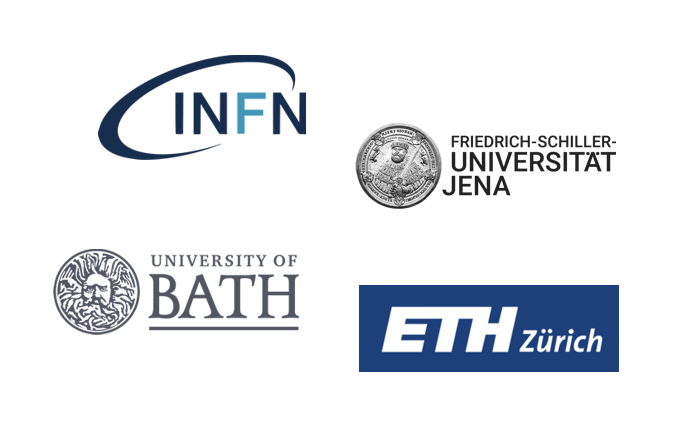AVA welcomes new Partners

The AVA consortium is pleased to announce its new partner organisations - ETH Zurich, INFN Genova, University of Bath and Friedrich Schiller University of Jena. Due to the developments in the research projects of some AVA Fellows, it was advantageous to expand the network and complement the expertise within AVA.
Institute for Particle Physics and Astrophysics (IPA) from the Physics Department of the Eidgenössische Technische Hochschule Zürich (ETH Zurich) has joined AVA for the purpose of hosting a secondment of the AVA Fellow Amit Nanda. As a member of the GBAR project (Gravitational Behaviour of Anti hydrogen at Rest) at CERN, IPA is already deeply involved in antimatter research. Similar to the majority of the antimatter projects encompassed by AVA, GBAR is located at the Antiproton Decelerator of CERN. The primary focus rests upon precise gravity studies of antimatter. However, IPA also aims for a measurement of the Lamb shift in antihydrogen. They currently operate a hydrogen beam experiment at ETH to prepare the equivalent study on antimatter when accelerator operation is restarted at CERN after the current long shut down. This project uses very similar techniques as the measurement on the hyperfine structure of (anti-)hydrogen, which are pursued by the ASACUSA collaboration that Amit is part of.
Prof Gemma Testera of INFN Genova is recognized as being one of the world experts on ultra-cold charged plasmas. For decades, she has been leading a group that has specialized in the physics of cold charged plasmas and has a very long-standing involvement in antiproton-related research (inter alia in the ATHENA and AEgIS experiments at CERN’s Antiproton Decelerator), in precision measurement electronics at cryogenic temperatures, in ultra-fast and low noise control electronics and in plasma diagnostic techniques. AVA Fellow Mattia Fani has expanded the scope of his research project by further focusing on the behaviour, manipulation and characterization of ultra-cold antiproton plasmas, as well as on detection techniques for cold positrons and positronium. In the course of the analysis of his data, it has become clear that he could deepen his expertise in the field of cold charged plasmas by interacting with one of a handful of experts in Europe in this field – Gemma Testera. This provides Mattia with a unique opportunity to acquire expertise on the physics of ultra-cold antiproton and positron plasmas, undoubtedly of benefit also to several other AVA partners.
Much synergy in the research of AVA Fellow Bruno Galante and Dr Cole at the University of Bath (UoB) has been identified. This CERN-Bath collaboration will provide direct access between nanoscale material engineers and particle accelerator end-users, providing a very valuable means of engineering dedicated nanostructured electron sources that are tailored to the functional and research needs of CERN researchers. The collaboration also presents a unique opportunity to identify applications at higher technology readiness levels. Equipment sharing is a critical part of this collaboration, with Bruno being granted in-kind access to the UoBs Vacuum Nano Electronics laboratory’s field electron emission measurement system. This custom-built, state-of-the-art electron emission measurement system is the only one of its kind in the UK and has measurement capacity that aligns extremely well with the needs of Bruno’s AVA project. It gives Bruno the opportunity to research the growth and electron emission properties from 1D carbon nanomaterials and their application in advanced electron emissions sources.
Finally, the Friedrich Schiller University of Jena (FSU Jena) in Germany offered to AVA Fellow David Haider to carry out a secondment at the Institute of Solid State Physics under the supervision of Prof. Frank Schmidl. The group of Prof Schmidl focuses on the development of SQUID-based magnetic field measurement for use in unshielded environments. This will benefit the development of non-contact magnetic field sensors for heavy-ion and antimatter research. The knowledge of the group is very relevant to David’s research and allow him to participate in measurements to characterize both, finished CCC-sensors and CCC-sensors under construction.
Welcome!